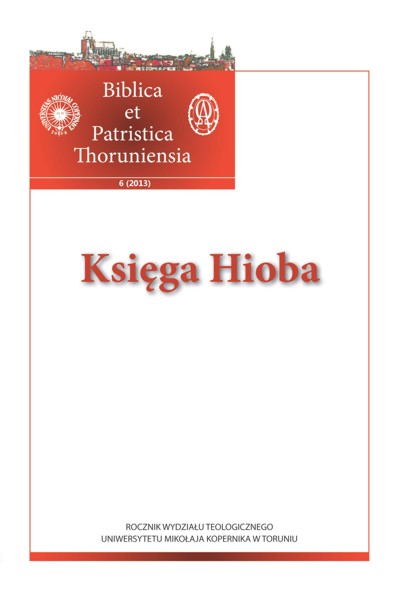Seven Interesting Things about the Epilogue to Job
DOI :
https://doi.org/10.12775/BPTh.2013.001Mots-clés
the Book of Job, the Epilogue, the fortunes of Job, the wrath of Jahwe, intercessory prayer, “false naivety”Résumé
In this paper I will draw attention to seven points in Job 42:7–17 that are not usually noticed or satisfactorily explained. (1) In what way has Job spoken of Yhwh what is right? (2) Does Job know of Yhwh’s evaluation of him? (3) Why is Yhwh at risk of behaving outrageously? (4) Why should Job’s prayer here be efficacious when his prayer in chap. 1 was not? (5) When are Job’s fortunes restored? (6) What does the doubling of Job’s possessions signify? (7) Why does Job live 140 years after his dispute with Yhwh? The Epilogue will be shown to be more subtle than is generally recognized, and the writing may be another example of the “false naivety” I have argued for previously in the Prologue.
Références
Bracke J. M., “šűb šébűt: A Reappraisal,” ZAW 97 (1985).
Clines D. J. A., “Job’s Fifth Friend: An Ethical Critique of the Book of Job”,Biblical Interpretation 12 (2004) 233–50.
Clines D. J. A., The Dictionary of Classical Hebrew, VIII: Sin–Taw [Sheffield: Sheffield Phoenix Press, 2011].
Iwański D., The Dynamics of Job’s Intercession (AnBib, 161; Rome: Pontifical Biblical Institute, 2006).
Job 38–42 [Word Biblical Commentary, 18B; Nashville, TN: Thomas Nelson, 2011].
Newsom C., “The Book of Job. Introduction, Commentary, and Reflections”, in The New Interpreter’s Bible (ed. Leander Earl Keck; Nashville: Abingdon Press, 1996).
Numfor Ngwa K., The Hermeneutics of the “Happy” Endingin Job 42:7–17 (BZAW, 254; Berlin: Walter de Gruyter, 2005).
Téléchargements
Publiée
Comment citer
Numéro
Rubrique
Licence
CC BY ND 4.0. Posiadaczem prawa autorskiego (Licencjodawcą) jest Autor, który na mocy umowy licencyjnej udziela nieodpłatnie prawa do eksploatacji dzieła na polach wskazanych w umowie.
- Licencjodawca udziela Licencjobiorcy licencji niewyłącznej na korzystanie z Utworu/przedmiotu prawa pokrewnego w następujących polach eksploatacji: a) utrwalanie Utworu/przedmiotu prawa pokrewnego; b) reprodukowanie (zwielokrotnienie) Utworu/przedmiotu prawa pokrewnego drukiem i techniką cyfrową (e-book, audiobook); c) wprowadzania do obrotu egzemplarzy zwielokrotnionego Utworu/przedmiotu prawa pokrewnego; d) wprowadzenie Utworu/przedmiotu prawa pokrewnego do pamięci komputera; e) rozpowszechnianie utworu w wersji elektronicznej w formule open access na licencji Creative Commons (CC BY-ND 3.0) poprzez platformę cyfrową Wydawnictwa Naukowego UMK oraz repozytorium UMK.
- Korzystanie przez Licencjobiorcę z utrwalonego Utworu ww. polach nie jest ograniczone czasowo ilościowo i terytorialnie.
- Licencjodawca udziela Licencjobiorcy licencji do Utworu/przedmiotu prawa pokrewnego nieodpłatnie na czas nieokreślony
PEŁEN TEKST UMOWY LICENCYJNEJ >>
Stats
Number of views and downloads: 497
Number of citations: 0



